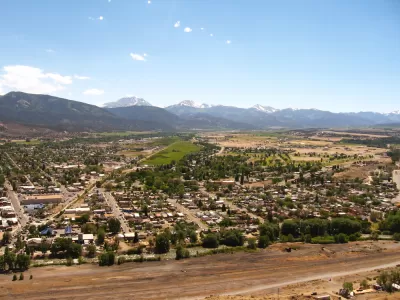In Colorado’s booming resort towns, even sleeping in your car has become an unaffordable luxury.

“Colorado’s widening kibosh on sleeping in vehicles adds to festering pain beneath the state’s recreation-oriented tourism and house-buying economic fervor,” writes Bruce Finley in the Denver Post. With homes selling for ten times as much as the local median income, workers who staff the popular lodging, restaurants, and other services that drive local economies find it increasingly hard to afford housing and must resort to sleeping in their cars. “The squeeze has intensified as the internet enables expanding commercial use of housing for short-term rentals and a COVID-19-era influx of well-to-do people fleeing dense-packed cities drives up prices.”
“Across mountainous western Colorado, cars as cocoons for sleep and sanity serve as last-resort shelters helping hundreds who provide services stay around.” To help provide a safe space for people living in cars, cities such as Salida have created designated parking zones that come with rules—and fees of as much as $300 a month. “These new accommodations have emerged as government-backed efforts to retain workers and also keep parking spaces free for visitors and well-to-do newcomers.” However, the town heavily enforces a ban on sleeping in cars on public property.
The programs have been criticized as a ‘band-aid’ solution to a much bigger problem, which will only be compounded by cold weather and an influx of winter workers.
FULL STORY: Colorado mountain towns lack affordable housing

Maui's Vacation Rental Debate Turns Ugly
Verbal attacks, misinformation campaigns and fistfights plague a high-stakes debate to convert thousands of vacation rentals into long-term housing.

Planetizen Federal Action Tracker
A weekly monitor of how Trump’s orders and actions are impacting planners and planning in America.

In Urban Planning, AI Prompting Could be the New Design Thinking
Creativity has long been key to great urban design. What if we see AI as our new creative partner?

The Vast Potential of the Right-of-Way
One writer argues that the space between two building faces is the most important element of the built environment.

Florida Seniors Face Rising Homelessness Risk
High housing costs are pushing more seniors, many of them on a fixed income, into homelessness.

Massachusetts Budget Helps Close MBTA Budget Gap
The budget signed by Gov. Maura Healey includes $470 million in MBTA funding for the next fiscal year.
Urban Design for Planners 1: Software Tools
This six-course series explores essential urban design concepts using open source software and equips planners with the tools they need to participate fully in the urban design process.
Planning for Universal Design
Learn the tools for implementing Universal Design in planning regulations.
Gallatin County Department of Planning & Community Development
Heyer Gruel & Associates PA
JM Goldson LLC
City of Camden Redevelopment Agency
City of Astoria
Transportation Research & Education Center (TREC) at Portland State University
Jefferson Parish Government
Camden Redevelopment Agency
City of Claremont





























